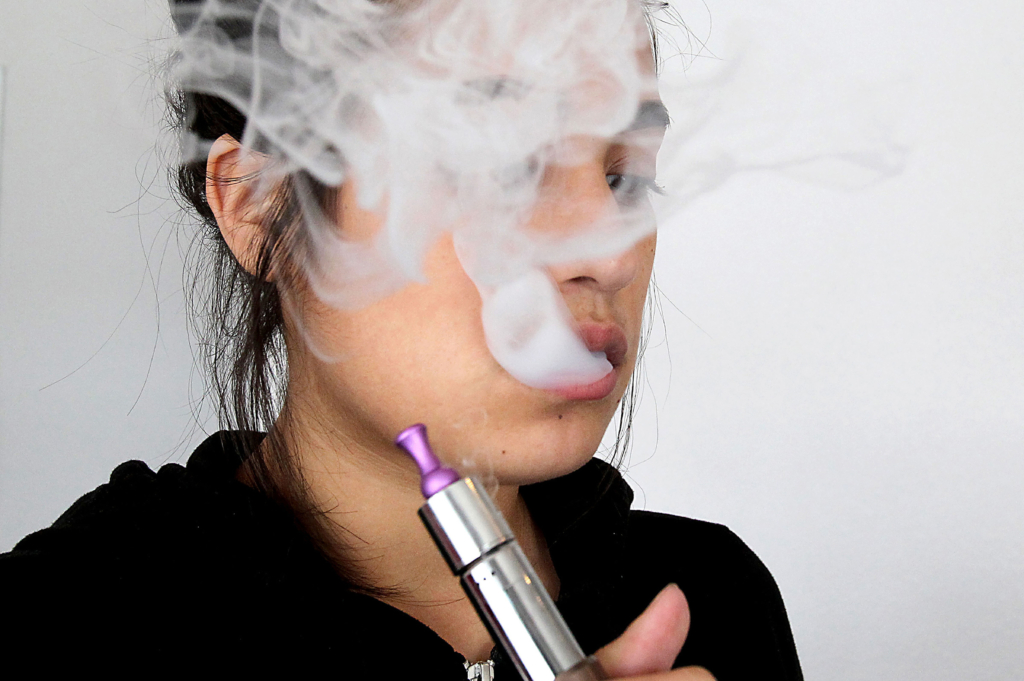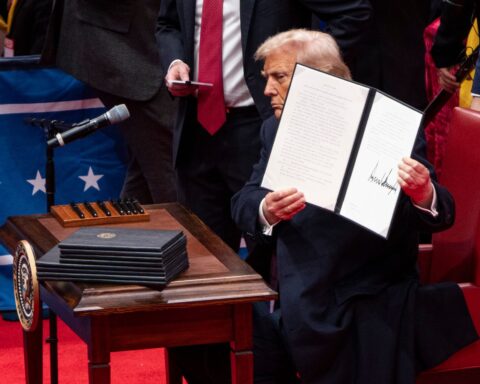Responding to an “epidemic of nicotine addiction” among young Americans, the U.S. Food and Drug Administration on Wednesday announced a comprehensive crackdown on e-cigarette manufacturers, directing the industry’s giants to draw up detailed plans for halting sales to minors and threatening to pull a wide range of products, including flavorings that appeal to underage buyers, from an exploding market.
FDA Commissioner Scott Gottlieb called the agency’s steps the largest coordinated enforcement effort in his agency’s history and said it was prompted by alarming new evidence that e-cigarette use by minors has risen to levels he called “simply not tolerable.”
In response to a nationwide undercover investigation of brick-and-mortar and online stores over the summer, the FDA levied civil fines on e-cigarette retailers found to have sold their products to minors and issued more than 1,300 warning letters.
What’s more, Gottlieb said the vaping industry appears to have turned a blind eye to the online practice of “straw purchasing” by retailers and individuals intent on buying vaping products and reselling them to minors.
The agency also ordered 12 online retailers to halt their continued marketing of e-liquids resembling kid-friendly food products such as candy and cookies. Although the FDA had acted in May to limit the sale of such products, they were still being offered, with the offending labeling and advertising, by the 12 online retailers, several of whom were also cited for sales to minors.
The FDA move was greeted with defiance and derision from the vaping industry.
“Thousands of small-business vape shops across America do not engage in irresponsible marketing practices and don’t even sell the products being targeted by the FDA with threatening letters,” said Gregory Conley, president of the American Vaping Association, a nonprofit organization that advocates for what it calls “sensible regulation.”
“Despite this, Commissioner Gottlieb is threatening to shut down all these businesses unless larger manufacturers unilaterally choose to change their marketing practices,” Conley added. “It is absolutely absurd and a perversion of how regulatory agencies are supposed to approach their work.”
Conley called Gottlieb’s initiative “nothing more than a gift to the tobacco industry,” whose stock prices jumped on news of the FDA’s vaping crackdown.
Public health groups, on the other hand, said lax regulation was the reason teen vaping became such a problem in the first place.
The American Cancer Society Cancer Action Network called Wednesday’s actions a “necessary first step” but said officials could do much more.
“FDA for years has repeatedly missed opportunities to keep tobacco products out of the hands of our children,” said Chris Hansen, the organization’s president. “Clearly the FDA knows who the industry culprits are in this epidemic and as such should exercise its full regulatory authority over these products rather than allow the industry to voluntarily self-correct.”
Gottlieb said the new enforcement actions mark the start of a “sustained campaign to monitor, penalize and prevent e-cigarette sales in convenience stores and other retail sites” to minors. He promised, too, that the FDA would be keeping close tabs on manufacturers’ own internet storefronts and distribution practices to detect sales to minors.
“The FDA has at its disposal both civil and criminal remedies to address demonstrated violations of the law,” he said.
E-cigarettes have become the tobacco product most commonly used by American adolescents. Their popularity is rising “very sharply,” Gottlieb said: In 2017, more than 2 million middle and high school students acknowledged they were current users of vaping products, according to the Monitoring the Future survey.
Data from the Centers for Disease Control and Prevention indicate that e-cigarettes have become the tobacco product of choice among middle and high school students.
In 2017, 11.7 percent of high-schoolers who participated in the CDC’s National Youth Tobacco Survey said they had vaped a tobacco product within the past month, up from 1.5 percent in 2011. In addition, 3.3 percent of middle school students called themselves current users of e-cigarettes, up from 0.6 percent in 2011.
The U.S. market for vaping products has exploded as well. Analysts at Wells Fargo estimated that Americans bought more than $2.3 billion worth of e-cigarettes between August 2017 and last month, and they expect annual sales to reach nearly $4 billion this year.
Add in other vaping products _ including vapor cartridges and related items sold at specialty shops _ and analysts say the entire market could be worth $6.6 billion this year.
In a speech at the agency’s headquarters in Silver Spring, Md., Gottlieb acknowledged that e-cigarettes present a public health conundrum.
In its bid to wean adult smokers from traditional cigarettes, the agency has sought to make a wider range of “reduced risk” tobacco products available to American consumers. Those products include e-cigarettes.
At the same time, the FDA has sought to avoid creating a new generation of Americans addicted to those products, or to the nicotine that has served as a powerful hook.
On Wednesday, Gottlieb put manufacturers on notice that the agency’s balancing act will lean more heavily on preventing youth addiction.
“This may create some obstacles for adults who want to enjoy e-cigarettes,” Gottlieb said. “But in closing the on-ramp for kids, we’re going to have to narrow the on-ramp for adults.”
Gottlieb also signaled that his agency is prepared to take more sweeping steps. He gave five e-cigarette manufacturers _ the makers of Vuse, Blu, Juul, MarkTen XL, and Logic vaping products _ two months to submit plans to “immediately and substantially reverse these trends.”
Failure to comply might prompt the agency to reconsider an earlier decision that gave manufacturers of tobacco products not on the market by August 2016 more time to submit new products to the FDA for pre-market review. He also said the agency is “considering the immediate removal … from the market” of e-cigarette flavorings that cater to underage users.
“Let me be clear: Everything’s on the table,” said.
Juul is the clear leader among e-cigarette brands, with $454 million in sales over the 12 months ending in February, according to the Wells Fargo report, which cited market data from the research firm Nielsen. Other big players are owned by big tobacco conglomerates; Camel parent British American Tobacco makes Vuse e-cigarettes, and Marlboro parent Altria makes MarkTen e-cigarettes.
Collectively, the five industry leaders command over 97 percent of the U.S. market for e-cigarettes, and Gottlieb took them to task for their response to concerns expressed earlier by the FDA about underage marketing and sales.
“They treated them as a public relations challenge,” Gottlieb said. “They’re now on notice.”
As part of its effort to turn the tide, the agency launched a new campaign to educate children and teens about the dangers of e-cigarettes. A primary concern for health experts is that kids will become addicted to nicotine and graduate to traditional cigarettes, putting them at risk for lung cancer. A report in the Journal of the American Medical Association found that 20 percent of high-schoolers who vaped frequently at the start of the study were smoking cigarettes frequently six months later, and another 12 percent were smoking occasionally. Meanwhile, among students who never vaped, only 2 percent started smoking during the same period of time.
Story by Melissa Healy with contributions from staff writer James Rufus Koren
L.A. Times (Tribune News Service)
















